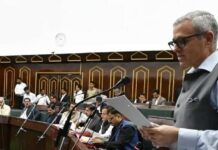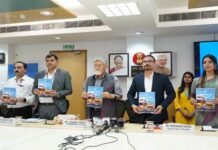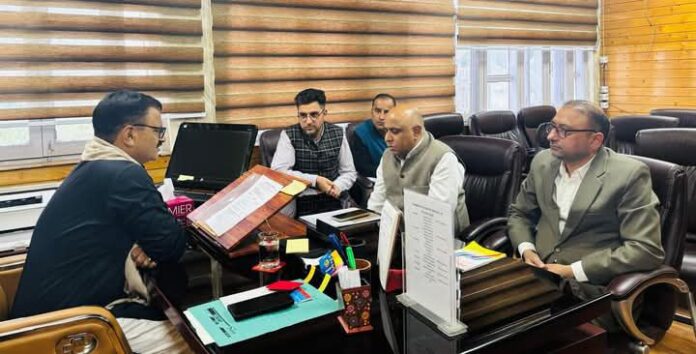APRIL 7: Minister for Forest, Ecology & Environment, Javed Ahmed Rana, today emphasized the urgent need for a unified approach to scale up the conservation and management of forest resources in Jammu and Kashmir, with a particular focus on wildlife conservation and eco-tourism development. The Minister made these remarks while chairing a review meeting of the forest department in Srinagar.
Highlighting the significance of coordinated efforts, Rana called for a collaborative strategy from all stakeholders involved in forest management. He stressed that only through a holistic and inclusive approach can the region effectively address the challenges of forest conservation, especially in the face of changing climate patterns.
“We have to work collectively for the efficient management and conservation of our forest resources. The conservation efforts have assumed huge significance owing to the changing climate pattern,” Rana said. His comments underscored the urgency of adapting to the environmental shifts and ensuring the long-term sustainability of the region’s natural resources.
The Minister also acknowledged the essential role of local communities in forest conservation. He emphasized that community forestry has been proven to reduce deforestation and promote sustainable land-use patterns. By engaging local populations, the forest department can foster greater responsibility and awareness, leading to improved forest protection and management.
“Local communities have an essential role to play in forest conservation. Community forestry has numerous benefits, such as reducing deforestation and promoting sustainable land use,” Rana added. He highlighted the potential of eco-tourism as an essential tool for generating revenue while supporting local communities. Eco-tourism, he stated, can provide a sustainable means of income for locals and help protect the region’s unique ecosystems.
“We have to focus our efforts on responsible eco-tourism, as it has proven beneficial in reducing the negative impacts on local ecosystems,” he said. The Minister also discussed the need for better forest protection measures, including curbing encroachment, poaching, and habitat degradation.
During the meeting, Rana also addressed the critical issue of forest fires, emphasizing the need to improve preparedness and response strategies. He called for enhanced monitoring and management, particularly in vulnerable areas, to mitigate the damage caused by forest fires. “We should enhance our efforts towards prediction, prevention, and control,” he said.
Additionally, Rana directed the concerned officers to ensure timely timber marking, extraction, and supply to meet the needs of the population, further stressing the importance of balancing conservation with community needs.RIL
Minister for Forest, Ecology & Environment, Javed Ahmed Rana, today emphasized the urgent need for a unified approach to scale up the conservation and management of forest resources in Jammu and Kashmir, with a particular focus on wildlife conservation and eco-tourism development. The Minister made these remarks while chairing a review meeting of the forest department in Srinagar.
Highlighting the significance of coordinated efforts, Rana called for a collaborative strategy from all stakeholders involved in forest management. He stressed that only through a holistic and inclusive approach can the region effectively address the challenges of forest conservation, especially in the face of changing climate patterns.
“We have to work collectively for the efficient management and conservation of our forest resources. The conservation efforts have assumed huge significance owing to the changing climate pattern,” Rana said. His comments underscored the urgency of adapting to the environmental shifts and ensuring the long-term sustainability of the region’s natural resources.
The Minister also acknowledged the essential role of local communities in forest conservation. He emphasized that community forestry has been proven to reduce deforestation and promote sustainable land-use patterns. By engaging local populations, the forest department can foster greater responsibility and awareness, leading to improved forest protection and management.
“Local communities have an essential role to play in forest conservation. Community forestry has numerous benefits, such as reducing deforestation and promoting sustainable land use,” Rana added. He highlighted the potential of eco-tourism as an essential tool for generating revenue while supporting local communities. Eco-tourism, he stated, can provide a sustainable means of income for locals and help protect the region’s unique ecosystems.
“We have to focus our efforts on responsible eco-tourism, as it has proven beneficial in reducing the negative impacts on local ecosystems,” he said. The Minister also discussed the need for better forest protection measures, including curbing encroachment, poaching, and habitat degradation.
During the meeting, Rana also addressed the critical issue of forest fires, emphasizing the need to improve preparedness and response strategies. He called for enhanced monitoring and management, particularly in vulnerable areas, to mitigate the damage caused by forest fires. “We should enhance our efforts towards prediction, prevention, and control,” he said.
Additionally, Rana directed the concerned officers to ensure timely timber marking, extraction, and supply to meet the needs of the population, further stressing the importance of balancing conservation with community needs.




















